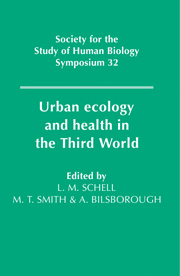Book contents
- Frontmatter
- Contents
- List of contributors
- Acknowledgements
- 1 Human biological approaches to the study of Third World urbanism
- 2 Social and cultural influences in the risk of cardiovascular disease in urban Brazil
- 3 The urban disadvantage in the developing world and the physical and mental growth of children
- 4 Differences in endocrine status associated with urban-rural patterns of growth and maturation in Bundi (Gende-speaking) adolescents of Papua New Guinea
- 5 Nutritionally vulnerable households in the urban slum economy: a case study from Khulna, Bangladesh
- 6 Urban-rural differences in growth and diarrhoeal morbidity of Filipino infants
- 7 Child health and growth in urban South Africa
- 8 From countryside to town in Morocco: ecology, culture and public health
- 9 Urban-rural population research: a town like Alice
- 10 Selection for rural-to-urban migrants in Guatemala
- 11 Health and nutrition in Mixtec Indians: factors influencing the decision to migrate to urban centres
- 12 Urban health and ecology in Bunia, N.E. Zaire, with special reference to the physical development of children
- 13 Food for thought: meeting a basic need for low-income urban residents
- 14 Immunological parameters in northeast Arnhem Land Aborigines: consequences of changing settlement patterns and lifestyles
- 15 Amerindians and the price of modernisation
- 16 Sex ratio determinants in Indian populations: studies at national, state and district levels
- 17 Polarisation and depolarisation in Africa
- 18 Urbanisation in the Third World: health policy implications
- Index
15 - Amerindians and the price of modernisation
Published online by Cambridge University Press: 26 December 2009
- Frontmatter
- Contents
- List of contributors
- Acknowledgements
- 1 Human biological approaches to the study of Third World urbanism
- 2 Social and cultural influences in the risk of cardiovascular disease in urban Brazil
- 3 The urban disadvantage in the developing world and the physical and mental growth of children
- 4 Differences in endocrine status associated with urban-rural patterns of growth and maturation in Bundi (Gende-speaking) adolescents of Papua New Guinea
- 5 Nutritionally vulnerable households in the urban slum economy: a case study from Khulna, Bangladesh
- 6 Urban-rural differences in growth and diarrhoeal morbidity of Filipino infants
- 7 Child health and growth in urban South Africa
- 8 From countryside to town in Morocco: ecology, culture and public health
- 9 Urban-rural population research: a town like Alice
- 10 Selection for rural-to-urban migrants in Guatemala
- 11 Health and nutrition in Mixtec Indians: factors influencing the decision to migrate to urban centres
- 12 Urban health and ecology in Bunia, N.E. Zaire, with special reference to the physical development of children
- 13 Food for thought: meeting a basic need for low-income urban residents
- 14 Immunological parameters in northeast Arnhem Land Aborigines: consequences of changing settlement patterns and lifestyles
- 15 Amerindians and the price of modernisation
- 16 Sex ratio determinants in Indian populations: studies at national, state and district levels
- 17 Polarisation and depolarisation in Africa
- 18 Urbanisation in the Third World: health policy implications
- Index
Summary
Amerindian and genetically related populations in North America currently are affected by a pandemic of obesity, diabetes, and gallbladder disease. This has arisen in just the past 40–50 years; the conditions were previously rare in Amerindian populations. The rapid development of the pandemic thus implicates changes in lifestyle, very likely involving dietary patterns such as excess calories or newly adopted foodstuffs, which have occurred on a continental scale. ‘Urbanisation’, even in small settlements, seems to be associated with dramatically increased risk. The evidence also suggests that the conditions have a genetic basis; that is, there is an interaction between genetic susceptibility and the environmental risk factors. In 1984 Weiss, Ferrell, and Hanis synthesised a variety of indirect pieces of evidence to hypothesise that these conditions constitute a single genetic entity, or ‘syndrome’, that is, are biologically interconnected conditions sharing genetic risk factors. Subsequent research reports have been consistent with that idea. In this paper we review some of that evidence, and present new supportive results from studies in Mexican Mayan and Mvskoke Creek Amerindians. However, no gene or genes that are responsible and would prove the syndrome hypothesis have yet been identified.
Introduction
After World War II, numerous reports began to appear documenting a rapidly increasing prevalence of non-insulin-dependent diabetes mellitus (NIDDM) in many groups of Amerindians. Tribal groups from essentially every part of North America were affected, and there were suggestions that the same problems existed in Central and South America.
- Type
- Chapter
- Information
- Urban Ecology and Health in the Third World , pp. 221 - 243Publisher: Cambridge University PressPrint publication year: 1993
- 2
- Cited by



